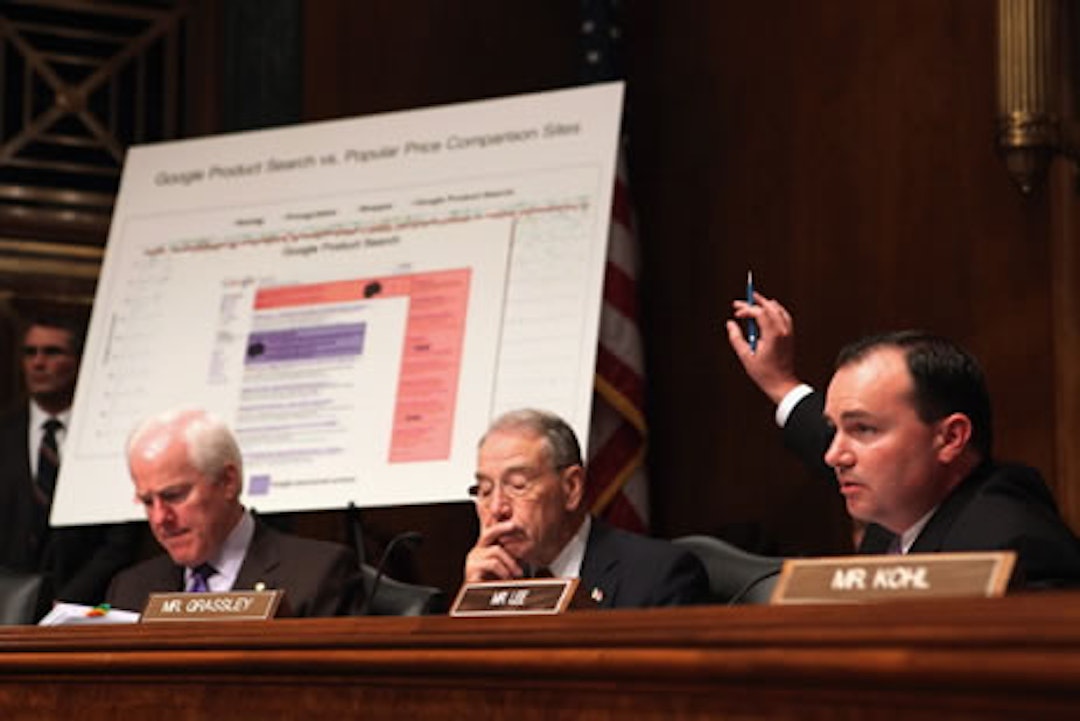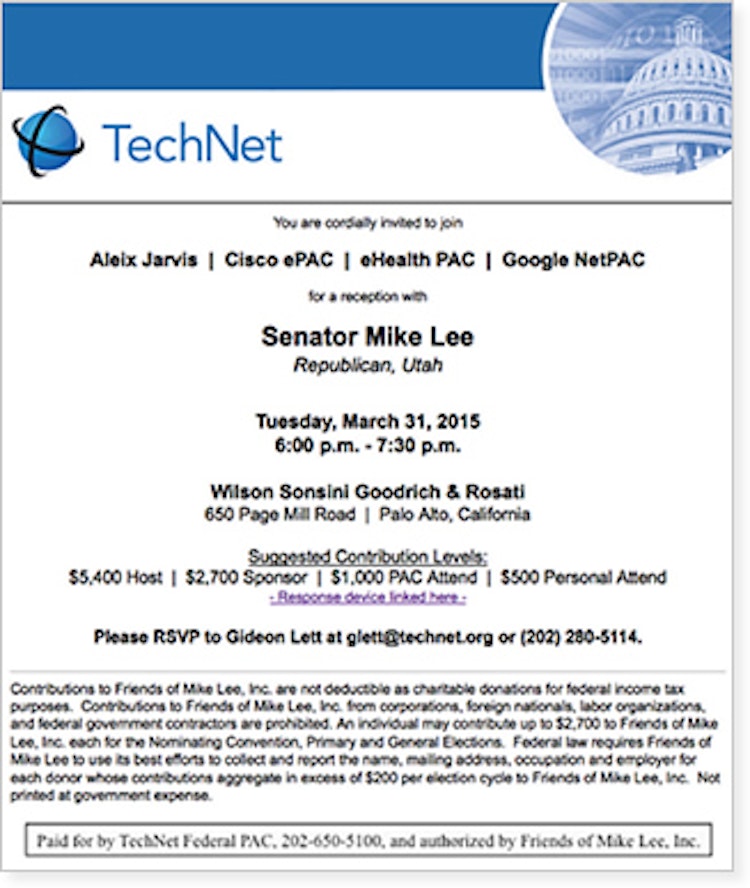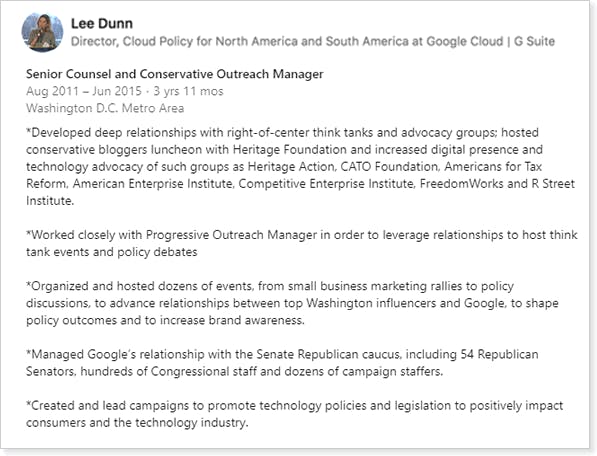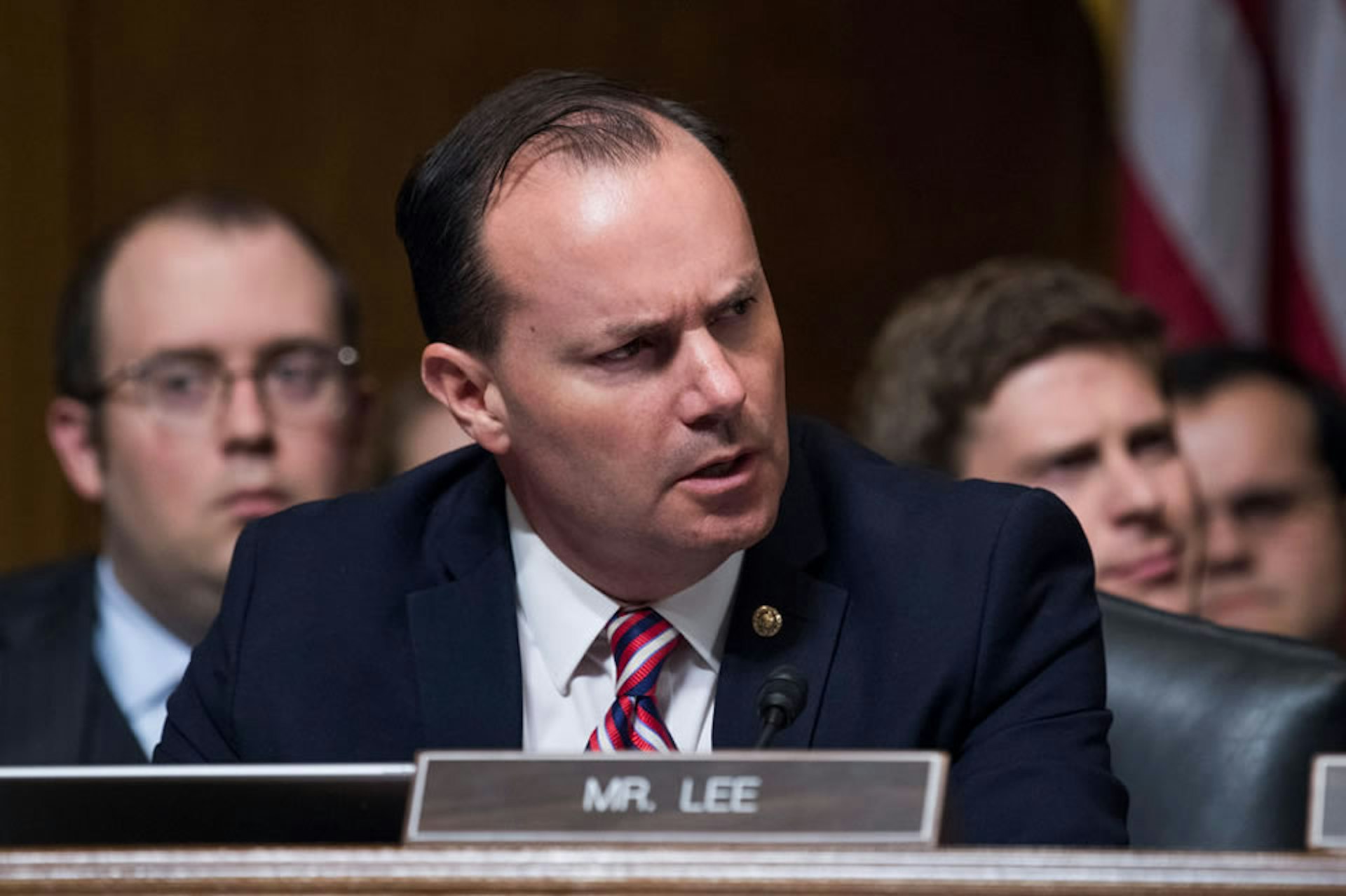When Eric Schmidt, Google’s executive chairman, appeared before the Senate antitrust subcommittee in September 2011, one of his toughest questioners was Sen. Mike Lee.
“You've cooked it so that you're always third,” the Utah Republican snapped at Schmidt, pressing him about a Google price comparison tool that, the senator said, often yielded results that were good for Google. “Senator, I can assure you we have not cooked anything,” Schmidt retorted.
It was the nearest the hearing had to a standout moment, and the tech giant took notice. The heated exchange dramatized the fact that Google had few allies among conservatives, who could normally be relied upon to defend a big company against government regulation.

Sen. Mike Lee was Google’s toughest critic at a 2011 Senate hearing. Today, his stance couldn’t be more different.
It wasn’t the first time Lee had sounded the alarm about Google’s growing market dominance. Before becoming a senator, Lee helped push a Utah law that critics said would have effectively banned Google’s largest revenue source, keyword advertising. In March 2011, Sen. Lee sent a strongly worded letter to the subcommittee’s chairman, Sen. Herb Kohl (D-Wis.), expressing his “strong concerns” about Google’s “possible abuse of its predominant position” in Internet search. He called for “vigorous antitrust oversight and enforcement in this area.”
A month later, Lee praised the Department of Justice (DOJ) for imposing rigorous conditions on one of Google’s acquisitions and renewed his call for antitrust oversight of the company.
And after the contentious September 2011 hearing, Lee kept pressing, joining with Kohl in urging the Federal Trade Commission (FTC) to investigate “whether Google’s actions violate antitrust law or substantially harm consumers or competition.”
But today, as he presides as chairman of the Senate antitrust panel, Lee’s stance couldn’t be more different. With critics on both sides of the political aisle assailing big tech, Lee has questioned the need for congressional antitrust investigations, complained about big fines imposed on Google, and defended the tech industry against Republican charges of liberal bias.
From "strong concerns about Google's...predominant position" to “Antitrust is not the answer”
Most recently, when the DOJ announced its own broad antitrust review of the leading online platforms in July 2019, Lee seemed to shrug, focusing not on the behavior of the tech companies, but on what he called the “institutional tug-of-war” between the Justice Department and the FTC.
What changed? A new analysis by the Google Transparency Project shows that Lee’s change of heart came after a lengthy, multifaceted campaign by Google and other big technology companies aimed at neutralizing Lee and his allies in the tea party movement. The company launched big projects in his home state and poured money into his 2016 reelection campaign, while Google and others in big tech hired away Lee’s staffers and allies.
As it courted Lee, Google also built what would quickly become a flourishing relationship with the Heritage Foundation, an influential Washington think tank with strong ties to Lee and others in the tea party movement.
Lee’s prominence among conservatives and his key role on the antitrust panel made him an especially valuable target for Google. But the company’s embrace of Lee is emblematic of the way it has moved to protect its right flank, wooing conservatives after years of building ties to Democrats.
Reaching Lee at Home
As Google sought to improve relations with Lee, it took a keen interest in his home state of Utah. In April 2013, three months after the FTC closed its long-running investigation of Google, the company announced that Provo would be the third market in the nation to receive Google Fiber, with Internet connections up to 100 times faster than existing broadband offerings.
Two years later, Google Fiber revealed plans to expand its service in the state, this time deploying the gigabit service in Salt Lake City. The March 2015 announcement came a week before a scheduled fundraiser for Lee organized by Google and other tech companies at Google’s Silicon Valley law firm Wilson Sonsini Goodrich & Rosati.

Google and other tech companies organized a fundraiser for Sen. Mike Lee in March 2015, and made hefty contributions to his reelection campaign.
But just a day before the scheduled event, The Wall Street Journal reported that Lee planned to ask the FTC about meetings it had with Google executives while the agency was conducting its antitrust investigation, making the timing of the fundraiser awkward.
Google backed out but the fundraiser went ahead at its law firm, netting major contributions for the senator. Google’s political action committee contributed $7,500 to Lee’s reelection campaign the day of the scheduled event, according to FEC records. Outside lobbyists and firms representing Google including Crossroads Strategies, Dutko, Off Hill Strategies, and Prime Policy Group contributed an additional $11,000 to Lee’s campaign on March 31 and in the days leading up to the fundraiser.
Other tech companies including Facebook and Yahoo, as well as tech lobbyists and Utah-based software executives, also donated to Lee’s campaign. In all, he raised at least $73,600 from tech-affiliated donors on March 31, more than twice the amount he raised in Internet industry contributions during the previous six years, from 2009-2014 ($33,350).1
From Google’s perspective, the successful fundraiser had the desired impact: Lee’s promise to investigate the FTC’s meetings with Google appears to have been quietly dropped.
Lee, who had been among the most vocal congressional critics of Google’s growing market dominance from 2011 to 2013, was silent on the issue throughout 2014 and in much of 2015. And after the March 2015 flare-up, the senator issued no public statements regarding Google or the growing anticompetitive threat posed by the company until late 2017.
Embracing Lee’s Washington Allies
As Google tightened its embrace of Lee, the company and its friends in big tech also recruited some members of Lee’s inner circle.
In March 2017, Google hired Max Pappas, a tea party activist and key Lee ally, to manage the company’s policy relationships with conservatives. As the former executive director of the FreedomWorks PAC, Pappas had backed Lee with direct mail and phone calls in his challenge to incumbent Sen. Bob Bennett in Utah’s volatile 2010 Republican primary.

Google hired Lee Dunn, a Republican congressional staffer, to build its relationship with conservative think tanks and advocacy groups
In November 2017, the Internet Association, a trade group that counts Google among its members, hired Lee’s senior counsel on the Senate Judiciary Committee, Mike Lemon, as its director of government affairs. And in late 2018, Amazon hired Bryson Bachman, the DOJ’s antitrust senior counsel and Lee’s former chief counsel on the Senate antitrust subcommittee.
Google also used new hires to make inroads into the broader conservative movement. Earlier, in August 2011, Google hired Lee Dunn, a former counsel to Republican Sen. John McCain, to be director of conservative outreach.
An early focus was the Heritage Foundation, the conservative think tank that has consistently been among Lee’s strongest allies. Just days after Lee’s contentious questioning of Schmidt in 2011, representatives of Google appeared at a Heritage briefing for bloggers to pitch conservative activists on the company’s free market bona fides.
The outreach paid off quickly. Two weeks later, Heritage researcher James Gatusso wrote a critique of the FTC’s antitrust investigation of Google. He mentioned Lee’s grilling of Schmidt and argued that restrictions on the company “would be unnecessary and harmful.”

As Google courted Sen. Mike Lee, it built a flourishing relationship with the conservative Heritage Foundation, an influential think tank with strong ties to the tea party movement
A few months later, the Heritage Foundation and Google’s own think tank co-hosted an event on how the Internet could modernize Cuba featuring Sen. Marco Rubio (R-Fla.) and Google Ideas director Jared Cohen.
Google also reached out to other conservative groups. By 2013, the company had added several names to the list of politically engaged groups to which it provided “substantial” financial support. They included Americans for Tax Reform, the American Conservative Union, the Federalist Society, R Street Institute, National Taxpayers Union and the Mercatus Center, as well as Heritage Action, the Heritage Foundation’s political arm.
It was a remarkable shift for a company with deep ties to Democrats.
As Google’s Lee Dunn explained, “You can’t put all your eggs in one basket.”
Several of the conservative groups mobilized to back Google in the closing days of the FTC’s antitrust investigation, including the National Taxpayers Union and the American Enterprise Institute, which touted Google as a shining example of success in a free market. AEI hosted an event in October 2012 to push a Google-funded white paper by former Supreme Court nominee Robert Bork, a friend of Lee’s, who argued competitors were using antitrust law to punish Google. The Competitive Enterprise Institute, another recipient of Google funding, also spoke out on the company’s behalf.
Sen. Lee’s Antitrust Transformation
When Lee finally returned to the topic of Google’s market position, it was clear how much his thinking had changed. In mid-December 2017, Lee’s antitrust subcommittee held a hearing titled “The Consumer Welfare Standard in Antitrust: Outdated or a Harbor in a Sea of Doubt?”
All but one of the five witnesses called to testify at the session were directly or indirectly funded by Google, and they were sympathetic to the “consumer welfare standard” on which the company had long relied to defend against antitrust accusations.
They included Joshua Wright, a former FTC commissioner who now works for Wilson Sonsini Goodrich & Rosati, the law firm that has worked for Google on antitrust matters, and Carl Shapiro, a University of California, Berkeley, business school professor. Shapiro co-authored a 2000 book with Google economist Hal Varian and worked at Charles River Associates, an economic consulting firm that advised Google during the FTC’s antitrust investigation.
Another witness was Diana Moss, the president of the American Antitrust Institute, which now lists Google as a “platinum sponsor,” though Moss has been ambivalent in her evaluations of antitrust policy. Witness Tad Lipsky is an adjunct professor at George Mason University’s Antonin Scalia Law School, home to the Law and Economics Center, which has received funding from Google.
By early 2018, Lee’s transformation from one of Google’s most vocal critics into one of its most faithful defenders was nearly complete. On January 10, Lee joined Fox News host Tucker Carlson in a testy back-and-forth over whether Google was censoring conservative speech and enforcing an ideological bias among its employees.
During the segment, Lee disagreed with Carlson’s assessment that large tech companies were a threat to privacy. At one point in the interview, Lee told Carlson that if he had an issue with Google he could simply “use another search engine.”
Roughly two months after the interview, Eric Schmidt and Google’s general counsel Kent Walker contributed a total of $8,100 to Lee’s campaign.
Lee told Carlson that if he had an issue with Google he could simply “use another search engine”
In April, the senator again rose to the defense of big tech, this time during Facebook chief executive Mark Zuckerberg’s appearance before the Senate’s Commerce and Judiciary Committees to discuss data privacy and Russian disinformation.
“Isn’t there a significant free market incentive that a social media company, including yours, has, in order to safeguard the data of your users?” Lee asked Zuckerberg. “Don’t you have free market incentives in that respect?”
The implication was clear: No regulation was necessary.
A month after Lee’s softball questioning of Zuckerberg, Facebook announced it would build a $750 million data center in his state of Utah. The announcement followed an Amazon announcement a year earlier that it was building a new $200 million fulfillment center in Salt Lake County.
Throughout the remainder of 2018 and the first half of 2019, Lee became a more forceful advocate for big tech. In May 2018, he introduced legislation that would make it more difficult for the FTC to block mergers. Two months later, Lee complained that the European Commission’s $5 billion fine on Google for anticompetitive behavior had the “potential to undermine competition and innovation in the United States.”
The implication was clear: No regulation was necessary
In February 2019, Lee joined with Sen. Kamala Harris (D-Calif.), introducing legislation supported by Google, Microsoft, and others to reform the way work-based visas and green cards are distributed. Then in March 2019, he appeared to back off his 2011 concerns about whether antitrust enforcement might be needed to protect consumer privacy.
Later that month, Lee came to big tech’s defense once again, publishing an op-ed titled “Facebook, Google, others have big problems, but antitrust is not the answer.”
And, as it has before, Google seemed to return the favor to Lee and his home state. In April 2019, Google Cloud said it was expanding its infrastructure in Salt Lake City.




